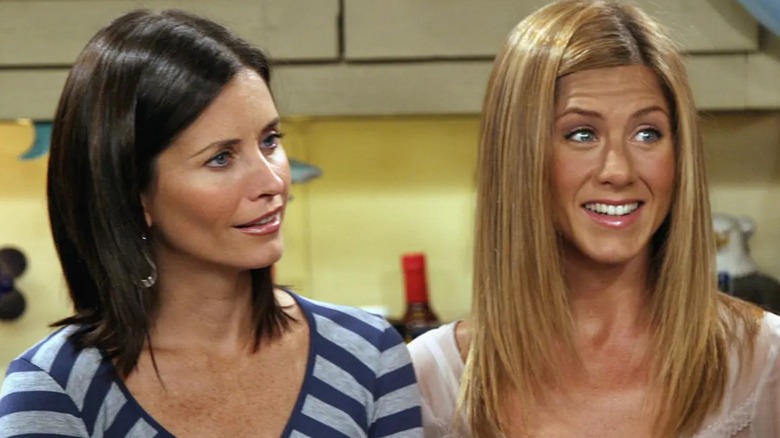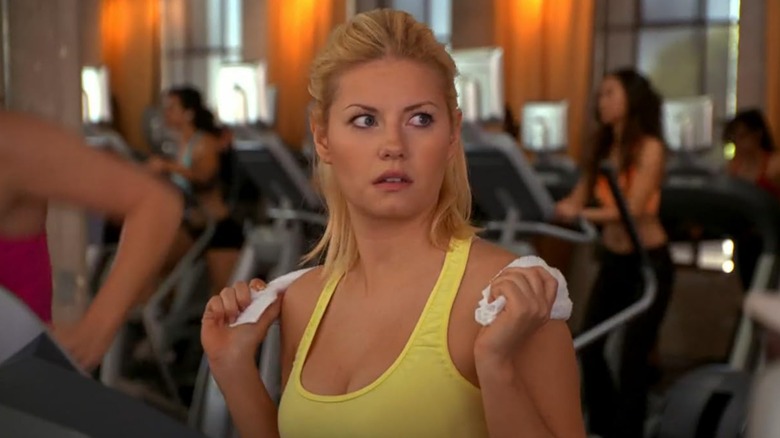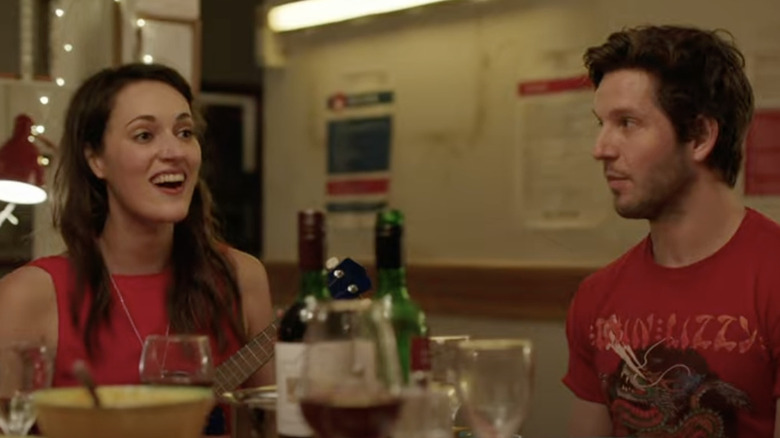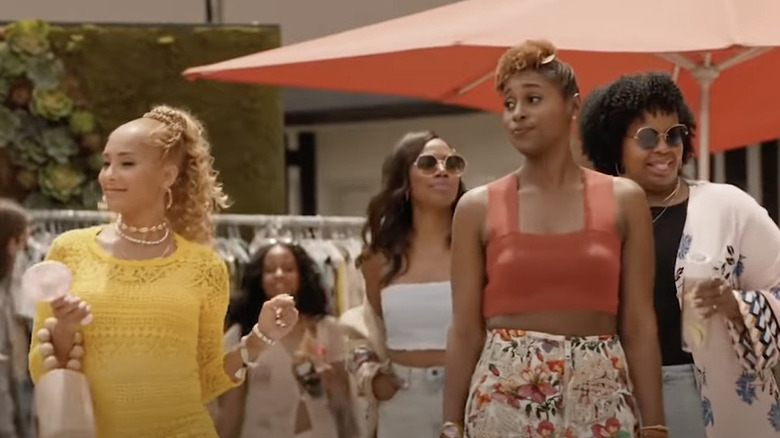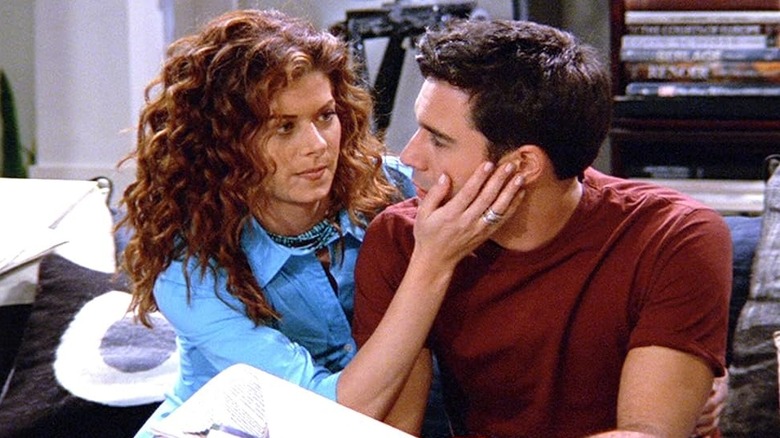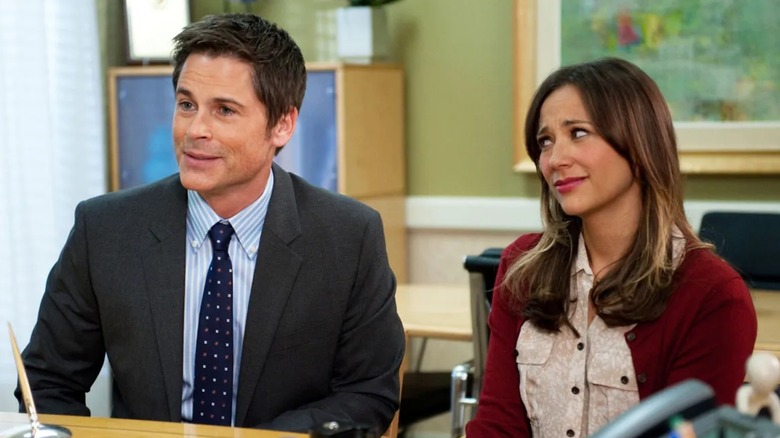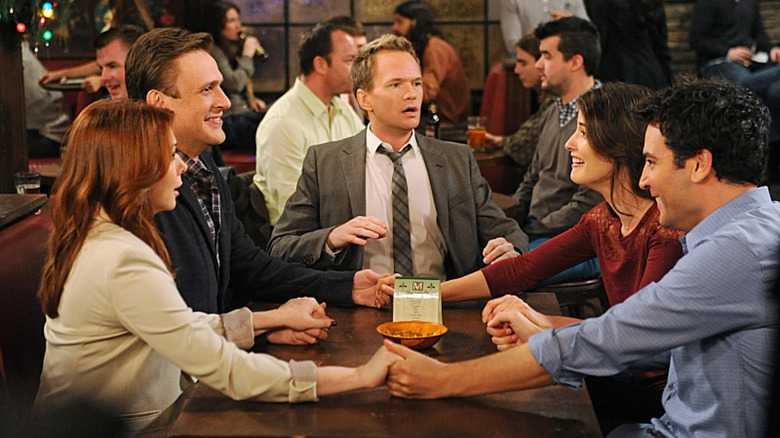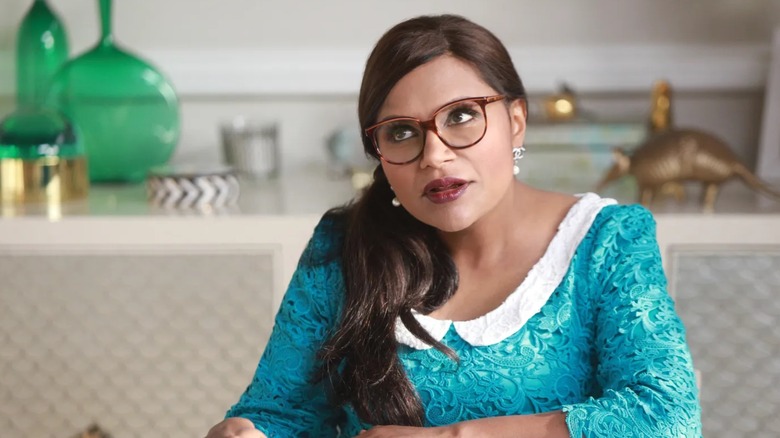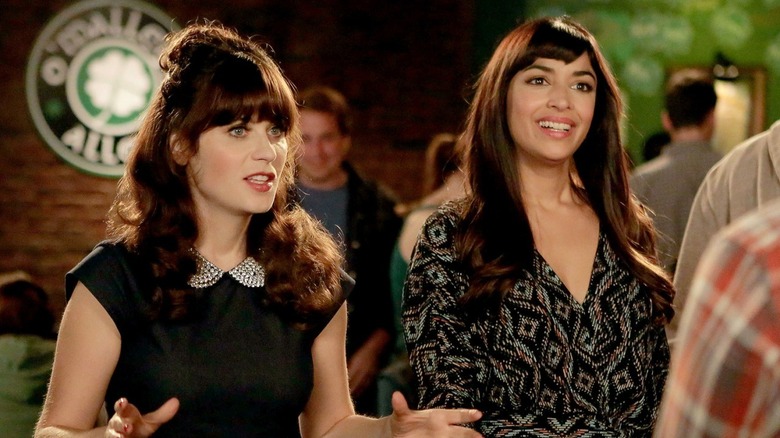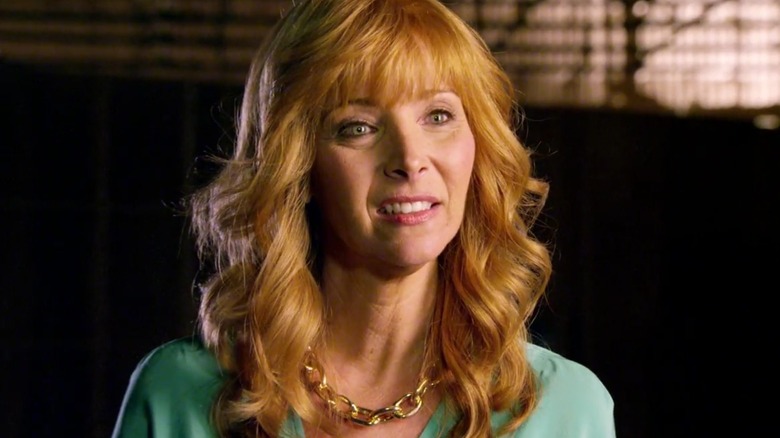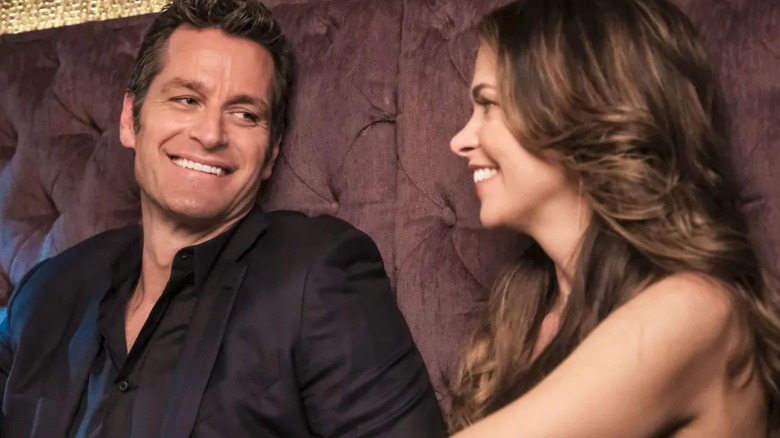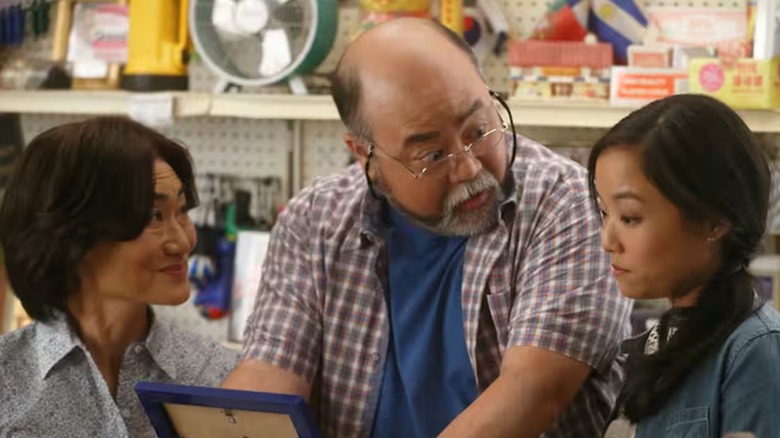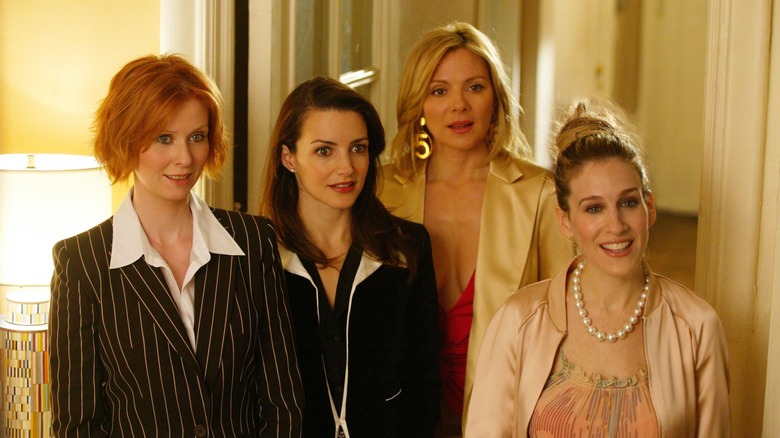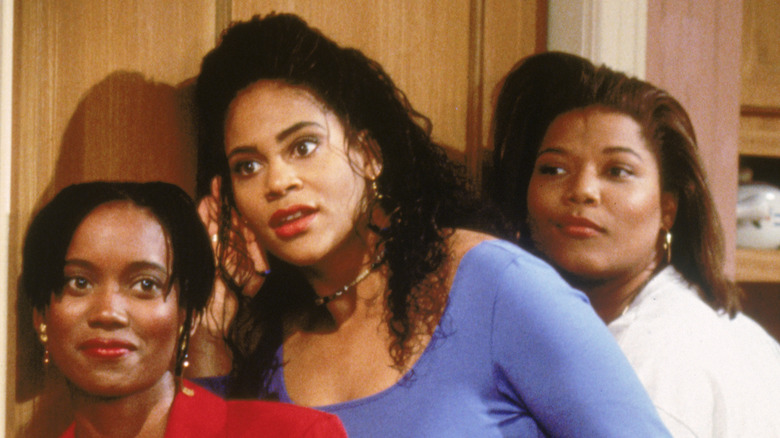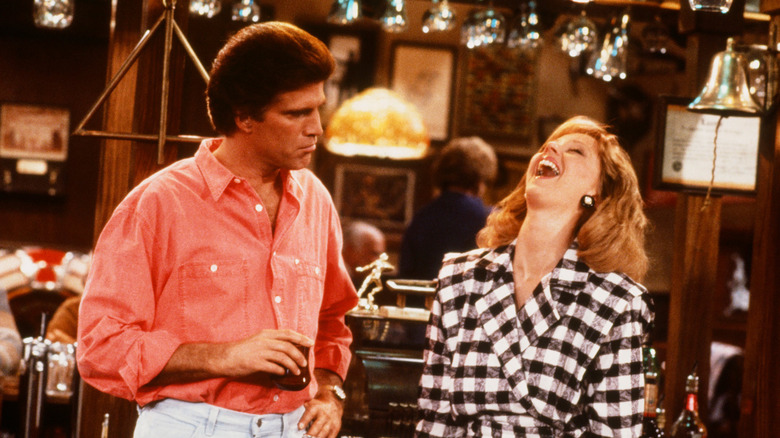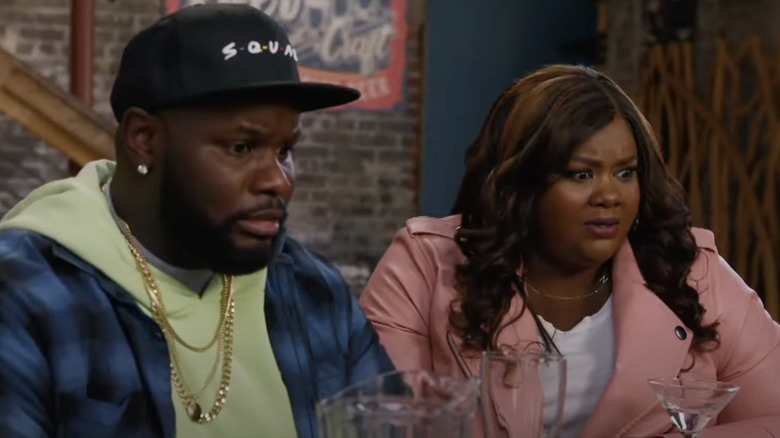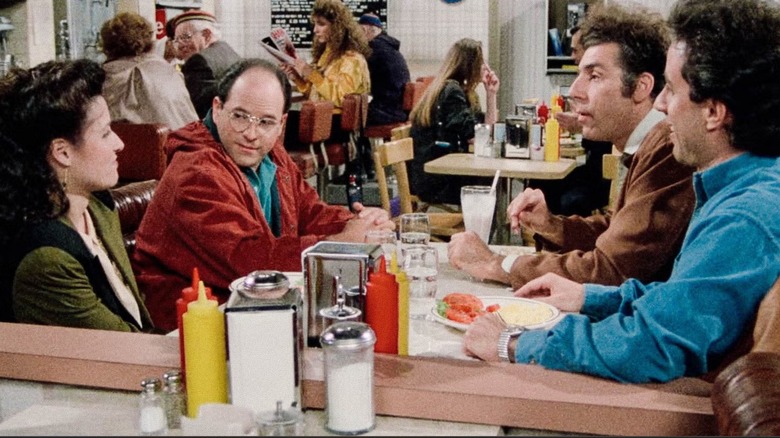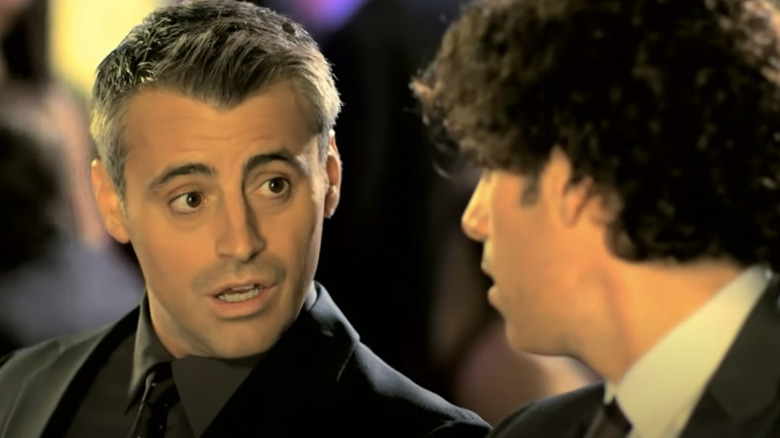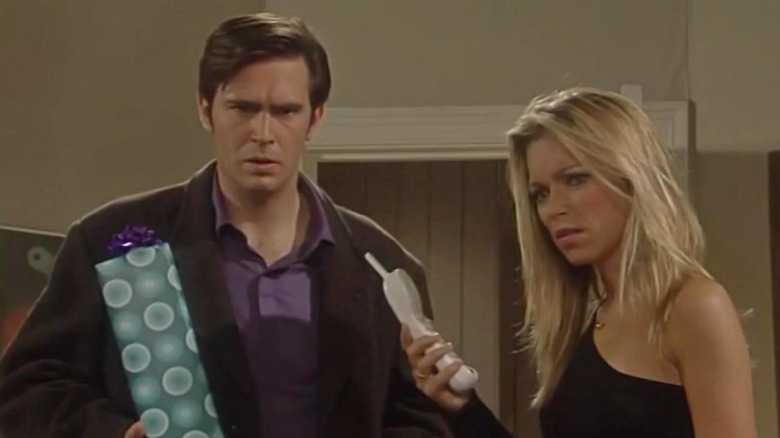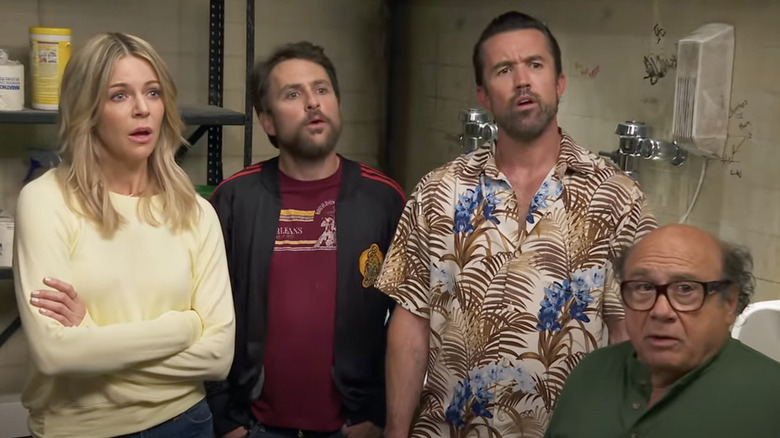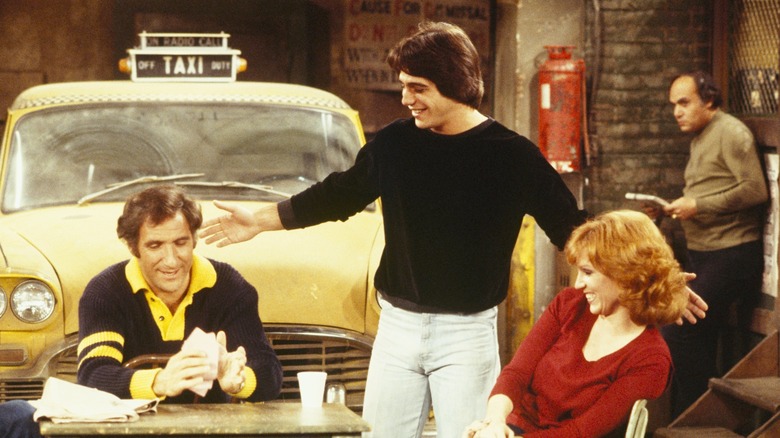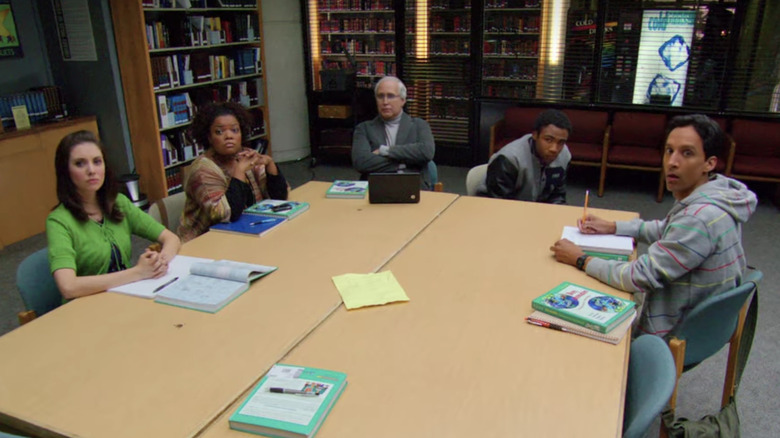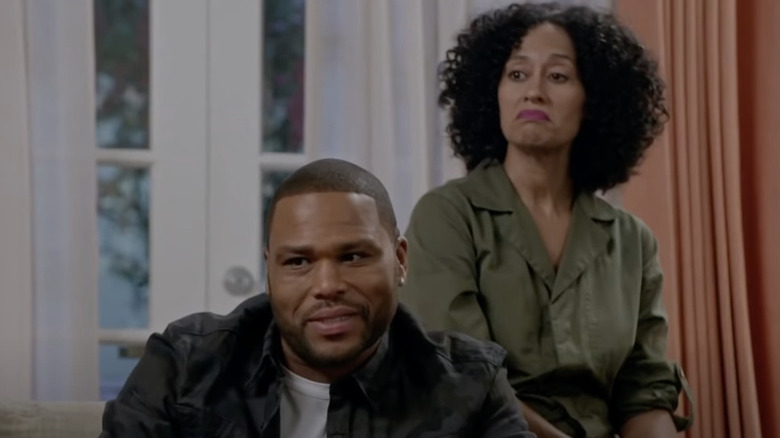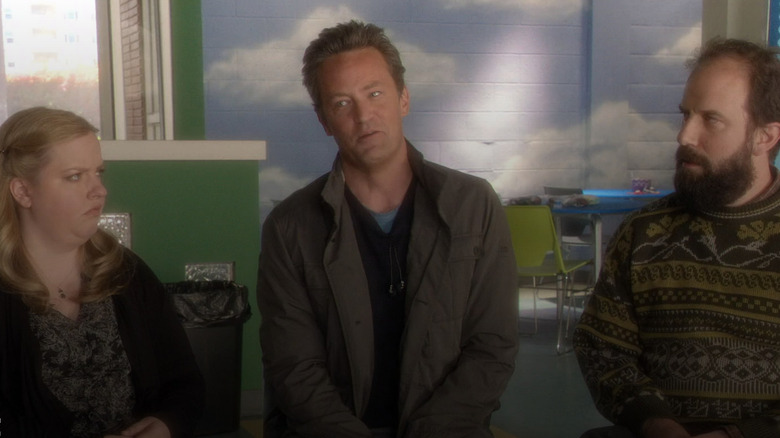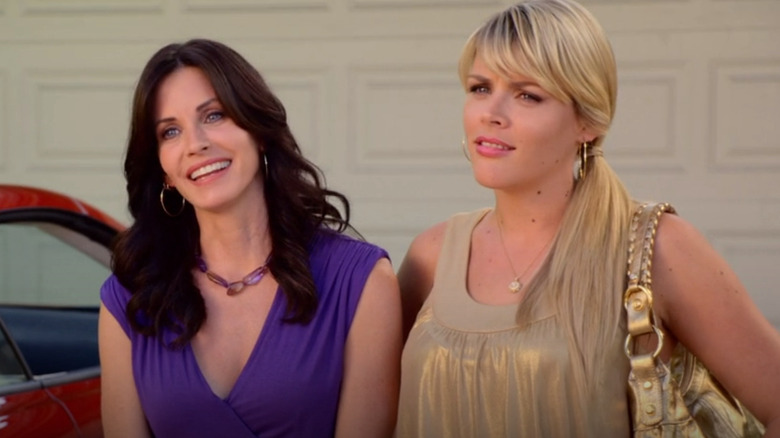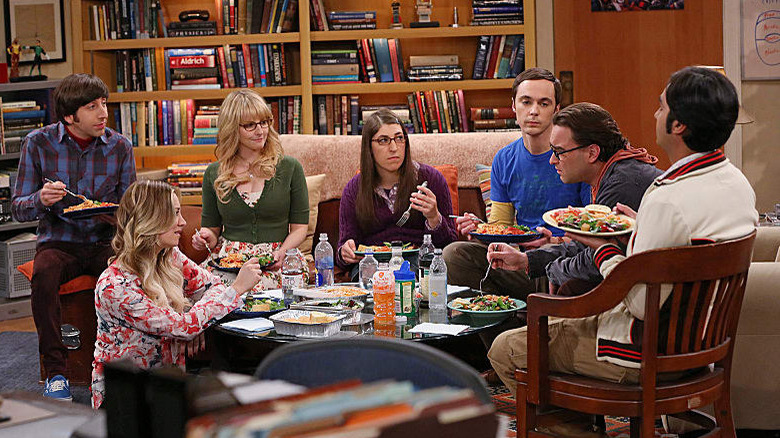25 Shows Like Friends You Should Be Watching
Since 1994, David Crane and Marta Kauffman's "Friends" has been a juggernaut in television and culture at large as audiences worldwide have returned over and over again to the six friends that will "be there for you." The premise is deceptively simple: 20-something friends in New York City hang out, mostly in a coffee shop, over the course of 10 years. Rachel, Ross, Monica, Phoebe, Chandler, and Joey all became household names, as everyone could identify with at least one, if not more, of the characters.
The inimitable chemistry of the cast elevated the series to a beloved sitcom that influenced many others thanks to its focus on friends (who are like family) rather than careers or love interests. This is the power of "Friends," since for many, these fictional friends really did feel like family.
"Friends" isn't the first show to focus on friendship, but it helped open the door for other series to explore these types of relationships in different settings. While at the heart of the series is the theme of chosen family, the show is also about figuring out who you are, which often requires the help of people you love. While some argue that "Friends" ruined comedy as executives sought to replicate its success, a number of shows have carved their own unique space in the wake of the series. Here are 25 shows that can also "be [your] lobster" and fill that "Friends"-shaped space in your heart.
1. Happy Endings (2011-2013)
Perhaps the closest contender for the new "Friends" was David Caspe's "Happy Endings." This series aired from 2011 to 2013 and although it never reached the cultural heights or mass consumption of "Friends," it developed a devoted fanbase that was obsessed with this sitcom about six friends living in Chicago. The series begins with a shift in a close-knit group: ditzy Alex (Elisha Cuthbert) unexpectedly leaves V-neck lover Dave (Zachary Knighton) at the altar, and their friends have to deal with this sudden split. There's the married couple of bossy Jane (Eliza Coupe) and candle-loving Brad (Damon Wayans Jr.); hot mess Max (Adam Pally); and looking-for-love Penny (Casey Wilson).
"Happy Endings" is like "Friends" mixed with a dash of mild sociopathy, a sprinkling of biting wit, and a peppering of blackout drunk Italian fluency. The chemistry of the cast is undeniable and the show has a type of black humor that's not present in "Friends." "Happy Endings" really is a show about friends hanging out and doing weird things all while being codependent and sometimes mean to each other (with love, of course). It takes the "Friends" foundation, shakes it up, and brings it to an absurd place that's as much "Arrested Development" as "Friends." Significantly, "Happy Endings" represented a friend group that wasn't only straight white people, which grounded it more in reality even as it also seemed to exist in some other universe filled with "dramaaaaa!"
2. Crashing (2016)
Before hitting it big with "Fleabag," British writer and actress Phoebe Waller-Bridge took her own stab at a "Friends"-type show with 2016's "Crashing." In the series, she plays free spirit Lulu, who moves into an abandoned hospital that's been turned into affordable housing, where her childhood friend and crush, Anthony (Damien Molony), also lives. Lulu befriends others in the hospital: Kate (Louise Ford), Anthony's control-loving fiancee; Sam (Jonathan Bailey), a sleazebag with a secret soft spot; Fred (Amit Shah), a sweet gay guy who gets close with Sam; Melody (Julie Dray), an existential French artist; and Colin (Adrian Scarborough), a lonely divorced man who becomes Melody's muse.
In typical Phoebe Waller-Bridge fashion, "Crashing" is off-kilter and demented as these characters engage from darker places of self-consciousness, insecurity, and grief more than their "Friends" counterparts would ever dare. The series is hilarious, with a mix of dry humor, physical gags, and melancholy that is ultimately about a group of people struggling to figure themselves out. "Crashing" explores the tension between the face we put on for others and the one that we show only to the people we're most intimate with. Waller-Bridge told The Guardian that she loves writing "vulnerable rascals," so with Lulu as a guide, "Crashing" shows us a world of people straddling that line between maturity and immaturity, adulthood and youth. Sadly, the series is only six episodes, but it's one worth revisiting over and over again.
3. Insecure (2016-2021)
One of the strongest and most significant shows about friendship is Issa Rae and Larry Wilmore's "Insecure," based on Rae's web series "Awkward Black Girl." Rae co-created and stars in this series as Issa, a woman in her late 20s living in Los Angeles who is navigating questions of friendship, love, and career. Issa struggles to figure out what she wants, whether being with her long-term boyfriend, Lawrence (Jay Ellis), or working in the non-profit world. She does all of this with the help of her friends: perfectionist lawyer Molly (Yvonne Orji), wild and confident Kelli (Natasha Rothwell), and settled adult(ish) Tiffany (Amanda Seales).
Although Issa and Lawrence have a Ross and Rachel "will they or won't they" arc, the central relationship of "Insecure" is between Issa and Molly. They're platonic life partners who see each other through everything and the fourth season explores a subtle but impactful shift within their relationship in a way that's not usually explored on TV. Where "Friends" familiarized the world with the soundstage version of New York, "Insecure" is inextricably situated within Los Angeles, which is as much a part of Issa's world as her friends and lovers. "Insecure" is often laugh-out-loud funny (with Kelli, in particular, stealing all the scenes she's in), but it's also rooted in a real emotional space as Issa and her friends try to grasp who they are and what they want.
4. Will and Grace (1998-2006, 2017-2020)
In the 1990s, the place to be every Thursday night was parked in front of NBC's "Must See TV" programming block, which included "Friends," "Seinfeld," and "ER." NBC struck gold again with Max Mutchnick and David Kohan's "Will and Grace" in 1998, which brought something new to TV: a gay protagonist. "Will and Grace" centers around Will (Eric McCormack), a gay lawyer, and Grace (Debra Messing), a hetero interior designer, who are roommates in New York City. Will's other best friend is the self-centered Jack (Sean Hayes), who, according to Megan Mullally's Karen Walker, "fell out of the gay tree, hitting every gay branch on the way down," while Karen herself is Grace's super-rich, vodka-and-pill-loving assistant who keeps things "real" for the gang.
While aspects of "Will and Grace" haven't aged well (i.e., its treatment of lesbians as a joke), and many called the show out for its stereotypical portrayal of gay men, "Will and Grace" was ultimately a trailblazer for LGBTQ+ representation. It was the first prime-time show to feature openly gay characters whose identities go beyond their sexuality. For many in the LGBTQ+ community, chosen family is highly significant, so it's not surprising that this is at the heart of "Will and Grace." Like "Friends," "Will and Grace" has some of the most memorable and hilarious sitcom characters around, and despite its issues, the show has a cast with undeniable chemistry and talent.
5. Parks and Recreation (2009-2015)
Greg Daniels and Michael Schur's "Parks and Recreation" explores the lives of a group of people in the fictional small town of Pawnee, Indiana. Leslie Knope (Amy Poehler) is an enthusiastic bureaucrat in Pawnee's parks department who loves her job, civic duty, and waffles. The series follows Leslie's journey as she attempts to take care of her town and engage with local politics, all while dealing with friends, boyfriends, and townspeople who don't always understand that she has their best interests at heart. The people in Leslie's world include Ron Swanson (Nick Offerman), her rugged, private, libertarian boss, Ann (Rashida Jones), her number one best friend, April (Aubrey Plaza), a cynical but secretly ambitious intern, and Tom (Aziz Ansari), a flashy assistant who's bigger than this town.
Like "Friends," "Parks and Recreation" makes use of a brilliant ensemble cast of individually talented actors who elevate each other to new heights. They're great on their own, but the magic is when they interact with each other, which introduced the world to gems like Donna (Retta) and Tom's "treat yo self" lifestyle, Jean Ralphio (Ben Schwartz) and Mona Lisa Saperstein's (Jenny Slate) competition for who's "the woooorst," and the entire cast getting blackout drunk on snake juice. "Parks and Recreation" is a hilarious show with heart that grounds this sitcom in emotional spaces like the sadness of a friend moving away or the bittersweet feeling of growing up and growing out of what you've always known.
7. How I Met Your Mother (2005-2014)
Craig Thomas and Carter Bays' "How I Met Your Mother" was one of the first shows to take the "Friends" torch, premiering a year after the "Friends" series finale and following a group of 20-somethings living in New York. Ted Mosby (Josh Radnor) is telling his kids the very long, very convoluted story of how he met their mother. Ted is a hopeless romantic on a quest for true love and he's bolstered on this search by his friends: kindhearted lawyer Marshall (Jason Segel), death-stare-enthusiast Lily (Alyson Hannigan), misogynistic womanizer with a secret romantic side Barney (Neil Patrick Harris), and independent, commitment-averse ex-girlfriend Robin (Cobie Smulders).
Ultimately, "How I Met Your Mother" is a show about a group of friends who grow together rather than about the search for love. The series finds a balance of archetypes -– like the romantic, the player, and the working woman -– but it fills out these limitations with long-running gags, the chemistry of its cast, and witty writing. Aspects of "How I Met Your Mother" don't hold up now (or even when it was on the air) -– Barney's horrendous misogyny is especially tough — and the show represents a world that seems to only be made up of straight white people, which absolutely shouldn't be overlooked. The series corrected some of these missteps with its spin-off, "How I Met Your Father," but the original still works in many ways to fill the "Friends" void.
8. The Mindy Project (2012-2017)
For some fans of "The Office," Mindy Kaling's Kelly Kapoor was a favorite character, so it was a treat to see Kaling star in her own show, "The Mindy Project." Kaling created this series and starred as Mindy Lahiri, an OB/GYN in New York City. Mindy navigates her personal and professional life, which often bleed onto each other as her co-workers become an integral part of her life. Danny (Chris Messina) is another doctor as well as Mindy's enemy-turned-best-friend-turned-love-interest, Jeremy (Ed Weeks) is a pompous British man who runs the office, and Morgan (Ike Barinholtz) is a goofy but charismatic nurse with a dark past.
"The Mindy Project" combines the humor and ensemble dynamic of a show like "Friends" with the workplace comedy situation of "The Mary Tyler Moore Show" to create something unique, peculiar, and totally Mindy Kaling. Mindy (the character and Kaling herself) is the heart of the show, which she demonstrates by embodying a multi-dimensional space of kindness, confidence, snark, and insecurity. She does all this as she struggles to balance both work and pleasure with her plan in a way that many professionals can relate to. Even though Mindy is an accomplished doctor who has worked hard to get where she is, she is also at times unsure of herself and challenged in ways that are understandable.
9. New Girl (2011-2018)
"New Girl" is the Los Angeles version of "Friends," about a group of 20-somethings sharing an apartment that they in no way could afford in the real world. Jessica Day (Zooey Deschanel) is a quirky, optimistic schoolteacher whose relationship suddenly ends, so she moves in with three guys she doesn't know. She meets curmudgeonly slacker Nick (Jake Johnson), sex-obsessed, self-proclaimed "baller" Schmidt (Max Greenfield), and talented but lost former basketball player Winston (Lamorne Morris). Jess discovers a whole new world of strange "man" rules, complicated drinking games, and sexual tension — but more than that, she discovers a whole new family with these Craigslist weirdos.
"New Girl" hits that sweet spot of a cast with good chemistry, memorable jokes, and relatable storylines. All of the characters struggle with their sense of self. Schmidt was once overweight and is constantly dealing with his insecurities of being an outsider, while Nick was once bound for law school and then dropped out, only to realize he doesn't know what to do or how to finish things. The beauty of the show is how these characters help each other figure these things out. It's hard to imagine anyone in "New Girl" thriving on their own, but together, they discover their best (and most surprising) selves. Winston is a "natural" cat dad, Nick and Schmidt are friends that share a bathroom towel (and sometimes underpants), and Jess is happiest in a loft with three sort-of grown men.
10. The Comeback (2005, 2014)
Anyone who loved Phoebe on "Friends" can get their Lisa Kudrow fix in the very un-Phoebe-esque satirical comedy, "The Comeback." Kudrow stars in the series, which she co-created with Michael Patrick King, and plays Valerie Cherish, a has-been sitcom actress who lands a new role after years of not finding work. The mockumentary-style show follows Valerie as she "got it:" a role in the sitcom "Room and Board." Valerie prepares to re-enter the spotlight and find a new place for herself in an ageist and sexist world that often has a short shelf-life for actresses.
"The Comeback" is a meta look at Hollywood. In the series, Cherish is taking part in a reality show called "The Comeback," which is supposed to be a companion piece to "Room and Board." Valerie can be simultaneously hilarious and heartbreaking as she struggles with a return to a world she once knew but that no longer embraces her and instead, more often than not, humiliates her.
Narcissistic, insecure, and lacking self-awareness, Valerie should be someone that audiences hate, but in Kudrow's hands, she's compelling and emotional. A particular standout is her relationship with Mickey (Robert Michael Morris), her hairdresser and best friend. In some ways, the show is more similar to "The Office" due to its super high cringe factor, but any fan of Lisa Kudrow would be remiss to miss out on "The Comeback."
11. Younger (2015-2021)
Darren Star's "Younger" explores intergenerational friendships in New York as Liza (Sutton Foster), a 40-year-old woman, lies about her age to get a job. Liza is recently divorced and starting over but discovers that no one is willing to hire a 40-year-old woman in a lower-level position, which is all she's qualified for since she left the book world to raise her daughter. So, Liza says she's in her mid-20s and gets an assistant job, where she joins the world of 20-somethings as she befriends fellow assistant Kelsey (Hilary Duff) and dates Josh (Nico Tortorella), a 26-year-old tattoo artist.
"Younger" puts a new spin on "Friends" as it integrates older people into its friend group. Although Liza's coworkers don't know how old she is, she still has ties to her actual younger self in Maggie (Debi Mazar), her best friend, offering a nice juxtaposition to Liza's interactions with her younger social network. "Younger" is a sweet comedy as Liza is thrown into a world of online dating and social media and the lingo the kids are using nowadays. However, it's grounded in the harsh reality of an ageist world — after all, is the idea of a woman having to lie about her age to get a job really so far-fetched? It's a realistic premise shown in a "Friends" type of way, with humor, beautiful people, and a New York City that doesn't seem to have any rats or unsavory creatures.
16. Kim's Convenience (2016-2021)
Ins Choi and Kevin White's "Kim's Convenience" (based on Choi's play of the same name) is about the Kims, a Korean-Canadian family in Toronto. Proud and blunt Appa (Paul Sun-Hyung Lee) was a teacher in Korea and later moved to Canada with his kind but meddlesome wife, Umma (Jean Yoon). They now run a convenience store, where they deal with regulars and keep an eye on their youngest, Janet (Andrea Bang), an aspiring photographer who feels a bit stifled by her parents. The Kims' eldest, Jung (Simu Liu), is estranged from the family after having a rough patch as a teenager where he stole from his father but secretly starts reconnecting with his mother and sister.
"Kim's Convenience" is a sweet sitcom that presents a new perspective on the classic workplace comedy as it focuses on an immigrant family rather than the middle or upper-class white people that usually feature in this genre. The series finds rich material in the clashes between the first generation Kim children and their more traditional parents, as well as between the Kims and others in the world who may see them in narrow-minded or stereotypical ways. Family is at the heart of this show, which explores what it means to define your own place rather than letting others tell you who you are. It's a similar theme used in "Friends," which also gives the characters room to surprise themselves and others with their growth and self-development.
18. Sex and the City (1998-2004)
"Friends" was a leader of the "beautiful and glamorous young people living in a shiny New York" genre, but Darren Star's "Sex and the City" brought this to a more provocative place. "Sex and the City" centers around sex columnist Carrie Bradshaw (Sarah Jessica Parker) as she lives in New York along with her best friends: cynical lawyer Miranda (Cynthia Nixon), conservative romantic Charlotte (Kristin Davis), and the very sex-positive publicist Samantha (Kim Cattrall).
When "Sex and the City" premiered in 1998, there was no other show like it, as it focused on a group of 30-something single women not only having a lot of sex but talking about it and enjoying it in hilarious and sometimes brutally honest ways. Thanks to "Sex and the City," people everywhere learned about the questionable ethics of breaking up via Post-It, the power of fake nipples, and the thrill of eating cake out of the garbage.
Elements of "Sex and the City" are super problematic as it's about people who are white, skinny, and (mostly) straight with endless disposable wealth. However, what makes the show powerful is its centering on female friendship and the possibility of women being platonic life partners. Carrie and her friends decide to be each other's soulmates and the fact that they make this choice at all -– in addition to showing the ups and downs of intimate female friendships –- makes "Sex and the City" a must-watch for any fan of "Friends" (or friendship).
20. Living Single (1993-1998)
"Living Single" preceded "Friends" by a year and may have directly led to its creation as it explores the relationships of a group of six single people living in a Brooklyn brownstone. Khadijah (Queen Latifah) is an editor of a Black magazine who lives with her happy-go-lucky cousin, Synclaire (Kim Coles) and snooty but bougie Régine (Kim Fields). Their unofficial other roommate is Maxine (Erika Alexander), a sharp-tongued lawyer, along with their upstairs neighbors, the stockbroker bro Kyle (T.C. Carson) and Overton (John Henton), the sweet handyman of the building.
Yvette Lee Bowser created "Living Single" when white people were primarily the ones given power both on and off-screen, and the influence of the show was immediate and long-lasting. In an oral history of the show, Bowser noted that she "was a very frustrated writer on a show about Black people where there were basically no Black people in power behind the scenes, so that set the tone ... I could create what I felt were more well-rounded depictions of us" (via The Atlantic).
"Living Single" accomplishes that with its sharp writing and cast that has amazing chemistry, which brought a combination of humor, warmth, and emotions to the series. What makes "Living Single" really stand out is its centering of Black female characters and friendships that have been further explored by series like "Insecure" but remain too rarely seen on TV even today.
21. Cheers (1982-1993)
Created by James Burrows and brothers Glen and Les Charles, "Cheers" is perhaps the ultimate "hangout sitcom" as it looks at the lives of a group of employees and regulars of the Cheers bar, "where everybody knows your name." Ted Danson is Sam, the owner of Cheers, a recovering alcoholic and lothario who tries to connect with others. Diane (Shelley Long) is his on-and-off-again love interest, who grew up with upper-class privilege and works at the bar after leaving her fiance. Other characters include waitress Carla (Rhea Perlman), who hates her customers, and Coach (Nicholas Colasanto), a sweet bartender who tends to forget orders but occasionally surprises with non sequitur words of wisdom.
Before Ross and Rachel, there was Sam and Diane, whose up-and-down relationship was the first serial sitcom storyline. "Cheers" was a cultural phenomenon, with 93 million people tuning into the 1993 series finale, making it the second most-watched finale to date. Like "Friends," the series hit the sweet spot with a brilliant cast that plays off each other and adds crackling energy to the "Cheers" bar.
Audiences couldn't get enough of the "Cheers" gang, so they flocked to see its spin-off, "Frasier," centered around one of the regulars at the bar. "Cheers" works because, at the end of the day, it's about a group of strangers who become friends and then family and consistently choose each other, even if they'd occasionally rather be doing something else.
23. Grand Crew (2021-2023)
Phil Augusta Jackson's "Grand Crew" premiered in 2021 and follows a group of six mostly male 30-somethings who hang out at a bar in Los Angeles and talk about their lives (while occasionally living them too). Noah (Echo Kellum) is a rom-com lover who desperately wants his life to be a romantic comedy; his sister, the emotionally avoidant Nicky (Nicole Byer), is looking for love; Sherm (Carl Tart) and Anthony (Aaron Jennings) are roommates who are sometimes at odds over things like kombucha; and Fay (Grasie Mercedes) is new to this grand crew, whom she met while working at the bar.
Show creator Jackson wrote for series like "Insecure," "Brooklyn Nine-Nine," and "Key and Peele," and brought his sharp eye for humor and absurdism to "Grand Crew," which resulted in some surprises (like Noah imagining his ex as one of the wild inflatable tube men outside car dealerships). Canceled in 2023, "Grand Crew" positioned itself as a Black male version of "Friends," as the bulk of the relationships were between these male characters (although Nicole Byer added a very welcome energy and perspective to it). It's not often that we get to see shows that are just about male friendships, and it was refreshing to see this in a comfortable (and comforting) genre like a sitcom.
24. Seinfeld (1989-1998)
Larry David and Jerry Seinfeld's "show about nothing" premiered in 1989 and introduced millions to the "yada-yada" world of Jerry (Seinfeld), George (Jason Alexander), Elaine (Julia Louis-Dreyfus), and Kramer (Michael Richards). "Seinfeld" is about these four sometimes obnoxious, often morally questionable, and always hilarious friends living, loving, and trying to get soup in New York City. Superficially, they could be seen as archetypes –- Jerry is the straight man, Kramer is the eccentric goofball, George is the neurotic one (okay, they all are), and Elaine is the progressive (ish) one –- but they're so much more than that.
The plotlines of "Seinfeld" can be ridiculous –- George pretending to be a marine biologist to impress a woman and then having to actually save a whale, for example –- but they're also rooted in very human spaces like longing, insecurity, and jealousy. Many of the stories of "Seinfeld" are mundane but taken to an extreme and absurd level (like an entire episode centered around waiting for a table at a Chinese restaurant).
"Seinfeld' takes the sitcom format and transforms it so that even this unoriginal premise of a group of friends living in New York City becomes completely original in the hands of David, Seinfeld, and the whole cast. Its postmodern and self-referential nature has become legendary and has never been replicated with the same success (even if you consider Seinfeld's claim that "Friends" ripped off his show), which makes "Seinfeld" a must-watch for any sitcom lover.
25. Episodes (2011-2017)
"Friends" co-creator David Crane and Jeffrey Klarik created "Episodes," which stars Matt LeBlanc as a satirical version of himself. The series is about the BAFTA Award-winning couple, Sean (Stephen Mangan) and Beverly (Tamsin Greig), who move to Hollywood to adapt their British sitcom for an American audience. While they're promised it will be a copy and paste job with minimal changes to their show, they're soon faced with pressure from the network to change almost everything, including the lead. Sean and Beverly are forced to hire Matt LeBlanc in the "erudite, verbally dextrous headmaster" lead role, a part that he's totally wrong for. While Sean succumbs to LeBlanc's charms, Beverly is less entranced by him and soon, all three are caught in a triangle that's as tense as it is hilarious.
Fans of Joey Tribbiani will be thrilled to see Matt LeBlanc playing a heightened version of himself. The "Episodes" version of LeBlanc is arrogant, self-absorbed, and has a short attention span, which leads to lots of laughs as well as a twinge of pathos as you watch him take on a role that even he knows isn't right for him but that he's determined to play because he needs a hit. The "Friends" cast has had mixed results in breaking away from the characters that made them mega-famous and LeBlanc, in particular, seems to have struggled (he was the only one to do a "Friends" spin-off), so it's exciting to see him in this funny meta role.
26. Coupling (2000-2004)
"Coupling" is the British "Friends" that follows six 30-something friends -– three men and three women –- who navigate love, life, and friendship. Neurotic Steven (Jack Davenport) starts dating the Type A Sue (Sarah Alexander). They navigate their new relationship with the help of their best friends, insecure Jeff (Richard Coyle) and beauty-obsessed Sally (Kate Isitt), and their exes, sex-obsessed Patrick (Ben Miles) and self-absorbed Jane (Gina Bellman).
"Coupling" displays the humor and wit that British comedies do so well, and it stands out for its juxtaposing of the male and female perspectives. Much of its humor lies in the very different ways all the characters see the same situation, and the different ways that the men and women talk about it. It's a wonder that these people connect at all, as they frequently seem to live in different realities.
"Coupling" takes the same idea of "Friends" and brings it to a raunchier and sometimes more complex space as the characters are more multifaceted and less shiny than their American counterparts. This may be due more to cultural differences between American and British humor. As Ricky Gervais wrote in Time, the British "are more comfortable with life's losers," leading to characters who are self-deprecating and rarely saying what they mean or feel. This all is evident in "Coupling," which takes the archetypes seen in "Friends" -– Monica's perfectionism, Rachel's vanity, or Chandler's insecurity -– and dials them up to an 11 to hilarious effect.
29. It's Always Sunny in Philadelphia (2005-present)
"It's Always Sunny in Philadelphia" is like "Cheers" and "Friends," if those shows were about narcissists and sociopaths. The series follows "The Gang," a group of "friends" (if a "friend" is someone who manipulates, abandons, and sells you out) who run and work at Paddy's Pub. Creator Rob McElhenney stars as Mac, the insecure wannabe tough guy; Dennis (Glenn Howerton) is the psychopathic, overly sexual one; Dee (Kaitlin Olson) is Dennis' twin sister, the occasional voice of reason who is actually quite violent; Charlie (Charlie Day) is angry, possibly illiterate, and has a substance abuse issue; and Frank (Danny DeVito) has a gambling addiction and prides himself on being "feral."
"It's Always Sunny in Philadelphia" takes friendship and nosedives into the abyss. After all, any human relationship has the potential for things like insecurity, jealousy, selfishness, and manipulation. "It's Always Sunny" uses all of this as its foundation as it centers around a group of people obsessed with themselves and with scheming, no matter the cost to anyone else. They're all more than willing to conspire against each other, and each character thinks that they're better than the rest but, of course, they're all the worst. Clearly, something has resonated with audiences as the series has made history as the longest-running live-action scripted comedy of all time. There's something cathartic in watching people behave in ways that perhaps we all wish we could sometimes.
If you or anyone you know needs help with addiction issues, help is available. Visit the Substance Abuse and Mental Health Services Administration website or contact SAMHSA's National Helpline at 1-800-662-HELP (4357).
31. Taxi (1978-1983)
Inspired by a New York magazine article, the classic "Taxi" follows a group of working-class taxi drivers who try to follow their dreams while driving cabs in New York City and avoiding the wrath of their immoral, bullying dispatcher, Louie (Danny Devito). Alex (Judd Hirsch) is the cynical "everyman" at the center of the chaos, whose even-keeled nature makes him a natural support for the others: the often-losing but always-kind boxer Tony (Tony Danza), single mother and aspiring artist Elaine (Marilu Henner), and Latka (Andy Kaufman), the eccentric mechanic from an unknown country.
"Taxi" deals with serious subjects like sexual harassment, addiction, and sexual identity while continuously returning to the question of "what happens if you can't make your dream come true?" The series was a star-making turn for its incredible cast as it marked some of the earliest works of people like Danny Devito, Tony Danza, and Christopher Lloyd. Beyond that, the series is a showcase for Andy Kaufman, whose subversive, sometimes chaotic energy added something unexpected to the sitcom form. Similar to "Friends," "Taxi" is about a group of different people who learn to be there for each other when things aren't going their way.
32. Community (2009-2015)
Dan Harmon's "Community" explores what happens when you make a family out of a group of people who have nothing in common. Jeff (Joel McHale) is a lawyer who lied about getting his undergraduate degree, so he enrolls in a community college to get a degree and practice law again. Jeff is manipulative, so he starts a fake Spanish study group to spend more time with his crush, the "progressive" but pretentious activist Britta (Gillian Jacobs). Others quickly join the group, including perfectionist Annie (Alison Brie), movie-and-TV-obsessed Abed (Danny Pudi), and bigot Pierce (Chevy Chase), among others. The gang often partakes in various schemes, either with each other or the dean of the school (Jim Rash).
"Community" is a more extreme version of "Friends," as it begins with a group of people who have no ties to each other. It makes hilarious use of these differences as the characters are often juxtaposed against each other, and each one believes him or herself to be "better" than the rest even though they're all terrible in their own particular ways. From the get-go, Jeff is a narcissistic schemer, which sets the stage for some of the wacky, off-kilter things that happen — but he does learn to look out for others over time. They all do, as "Community" follows an interesting arc of anti-heroes turning into "heroes," which is fun to watch, especially in the hands of people like Joel McHale, Alison Brie, and Donald Glover.
33. Black-ish (2014-2022)
Kenya Barris' "Black-ish" centers around the Johnsons, an upper-middle-class African-American family in Los Angeles. The heads of the Johnson family are Dre (Anthony Anderson), an advertising executive who will do anything to protect his reputation and shoes, and Bow (Tracee Ellis Ross), an anesthesiologist who tries to stay calm in the face of Dre's chaos. Dre is anxious that their four kids aren't "Black" enough as they live in a predominately white suburb and a time when Barack Obama has almost always been president. Dre is determined to teach his kids how to be Black while Bow is more concerned with making sure everyone is getting taken care of.
"Black-ish" stood out for a number of reasons, not least of which was its expression of joy. While the series wasn't afraid to delve poignantly into racism, the 2016 presidential election, and police brutality, "Black-ish" was rooted in the idea of love and life and the experience of these things by the Johnson family. This comes across in part because of the talent of the cast as it's very easy to believe they're all a family that is having fun together, which is what most closely aligns this series to "Friends." "Black-ish" was frequently laugh-out-loud funny: there's much humor to be mined in the parents' quest to give their kids the best lives possible, while at the same time wondering if they've messed them up for good.
36. Go On (2012-2013)
Matthew Perry took a couple of swings at post-"Friends" television success. To his credit, several of those shows were great — it's just that none of them had the ratings to grant them any real longevity. The modern take on "The Odd Couple" that paired him with Thomas Lennon lasted the longest at three seasons, but the rest never even got that second season renewal. However, the one that will likely most connect with "Friends" and Chandler Bing fans is "Go On."
Created by longtime "Friends" writer and producer Scott Silveri, the 2012-2013 NBC sitcom saw Perry play a talk radio host who has joined a support group to help cope with the passing of his wife. Taking a surreal bent at times, the show drew comparisons to fellow NBC comedy "Community," and was praised for a solid overall cast that included John Cho, Piper Perabo, Brett Gelman, and others. It's easily the most talented ensemble that Perry has ever been involved this side of the show that made him famous — and luckily Courteney Cox got her cameo in during what would be the show's single 22-episode season. It's easy to imagine more "Friends" cameos had the show continued, and the premise of "Go On" really would have allowed for Perry's old co-stars to play really fun, quirky characters.
37. Cougar Town (2009-2015)
The biggest show that any of the "Friends" alums got to be part of — certainly in terms of longevity — is "Cougar Town." Though its gimmicky-sounded name didn't do it any favors, the Courteney Cox-led comedy was much smarter and funnier than the name gave it credit for. It's also one of the most noteworthy examples in recent memory of a show being canceled by one network only to be picked up by and continue on for an extended period on another, with ABC axing it after three seasons and TBS picking it up for another three.
Cox isn't the only '90s sitcom veteran in the cast of this inventive comedy, with Christa Miller of "The Drew Carey Show" fame and Busy Philipps also playing residents of the show's fictional Florida town. "Cougar Town" is about women who are technically middle-aged on paper but are working hard to prove that being a fortysomething woman — especially one who has been forced to start over as the result of divorce — isn't the depressing dead-end that society so often makes it out to be. "Friends" fans will want to come to not only see Cox and multiple cameos from her old crew, but just a general overall look at what the twentysomethings of '90s television might have been up to two decades later, after they had moved to the suburbs — and how things might not have gone quite how they were hoping.
38. The Big Bang Theory (2007-2019)
The similarities between "Friends" and "The Big Bang Theory" are numerous. They both focus on a twentysomething social circle that contains an almost equal number of men and women, the two main locations are apartments across the hall from one another in the same building, there's a major "will they/won't they" couple at the center of the group that monopolizes the plot for several seasons, and much of the show just focuses on large group hangouts.
Of course, the primary difference is that the bulk of the "Big Bang Theory" group are so-called nerds, and a lot of the humor is derived from their geekiness and the way it affects how they interact with each other as well as others. But anyone who loves "Friends" because it's primarily just a show about a group of grown-ups who spend a lot of time together and have a deep affection for one another will find much of the same in "The Big Bang Theory" — only there are a lot more "Star Wars" references and jokes about subatomic particles.
